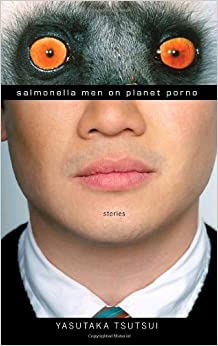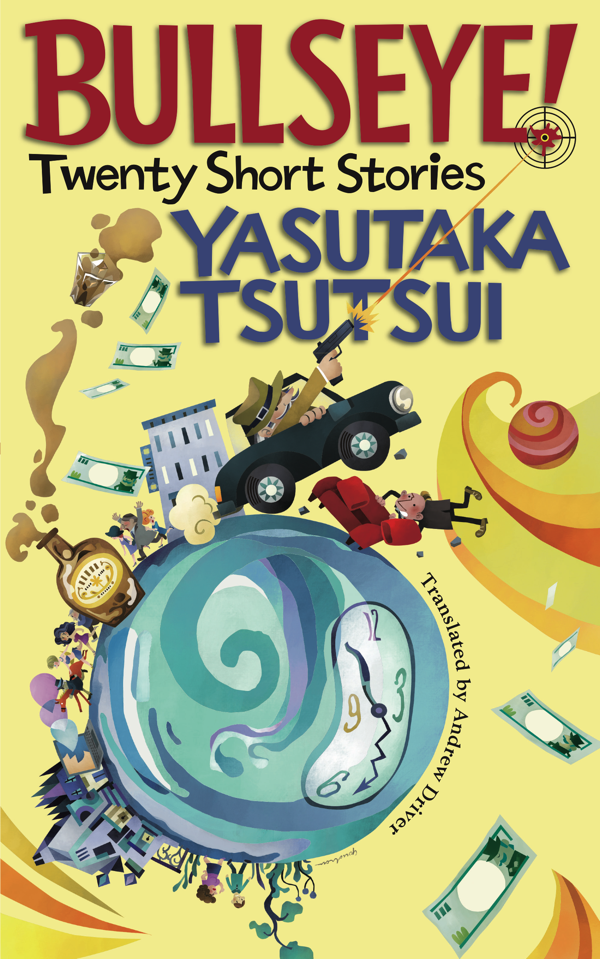
No, I haven’t branched out into reviewing erotica.
The title of Tsutsui’s collection is apt, however, as it features stories which are always bizarre and frequently feature sexual deviance.
Of course, normality and sexual propriety are cultural constructs, and Tsutsui delights in tearing these apart to examine them. Amongst this apparently wanton destruction, the reader is forced to recognise that many existing attitudes and habits of modern society are equally ludicrous.
What’s it about?
Sexual desire. Consumerism. Superficial obsession with minor celebrities. The insanity of war and politics. Middle class pursuit of leisure. The power of the media and the propensity of the masses to act like sheep. Defiance.
Tsutsui is renowned in modern Japan for his quirky take on satire, creating literature that defies easy categorisation and is never restricted by nebulous concepts like convention or reality.
For instance, in the appropriately titled story, The World is Tilting, an island gradually begins to tilt over until it’s occupants are risking serious injury attempting to dismount their own doorstep, yet many inhabitants refuse to leave and the tilt continues until their lives are ridiculous. Similarly, in The Last Smoker, Tsutsui’s determined protagonist ignores public health advice until all other smokers have been hounded out of their hobby or literally lynched, then engages in a desperate stand-off with the authorities and the enraged masses.
What’s it like?
Frequently surreal. Often insightful. Blackly humorous.
Stories begin with an odd situation and take further, unpredictable turns before concluding with a dark joke or a criticism of society. From the Dabba Dabba tree that engenders erotic dreams of a sufficiently disturbing nature to demand police involvement, to the commuter army that engages in a decades long war at the behest of negligent, distant and disinterested officials, to the sexually rampant planet that encourages visiting scientists to reverse the theory of evolution, Tsutsui introduces stories that intrigue and amuse in equal measure.
Not all stories are equally appealing. I still can’t fathom the point of a short tale about time travel and I disliked an even shorter biography of Mozart. I believe the tale is a satirical ridiculing of the typically effusive biographies extolling Mozart as a child genius, and I actually did giggle at a few of the ridiculous claims, but somehow the whole piece left me cold.
Just like in Tsutsui’s more recent collection, ‘Bullseye’, many stories have a surprisingly chilling ending, most notably Commuter Army, The Very Edge of Happiness and Hello, Hello, Hello. These were unquestionably my favourite stories from this collection: there’s a wonderful, airy, jokey ludicrousness about each of these developing tales, right up until Tsutsui delivers the chilling coup de grace and leaves you breathless.
What about the salmonella ladies?
The constant in all thirteen short stories is Tsutsui’s dark humour and an equally dark misogyny. The men are frequently idiots, led by their genitalia, but they also express opinions and act upon the world; the women are homogenous shrews, who complain that their husbands earn too little and fail to pleasure them frequently enough.
The one woman who takes a leading role in The World is Tilting, would be grotesquely flawed as a human being, had Tsutsui developed her character that far, but is viciously derided as a Feminist in a story that pits Women against Men and Men against the hysterical she-Devil’s that pass for Women. It is true that Tsutsui is interested in ideas and themes, rather than developing characterisation, but the theme of that story seems to be that feminism will destroy the world if left unchecked and kill the feminists who don’t repent and recant, so it really does feel quite odd to read in 2020!
Where women are not actively malevolent or viciously unsupportive of their husbands, they are simply absent. In the title story, a female scientist who has become pregnant as a result of being molested by a plant, is denied a voice as she is “too embarrassed” to attend the meeting of (completely male) experts who are to decide her fate. I found the story itself very entertaining
Final thoughts
Overall, then, I enjoyed most of these short stories for their absurdity and their deliciously morbid humour. I enjoyed recognising and appreciating the cultural commentary, especially in The Very Edge Of Happiness, Commuter Army and Hello, Hello, Hello, but the misogynistic tones may be too much for some modern readers.


